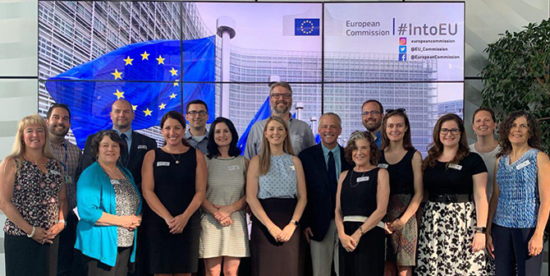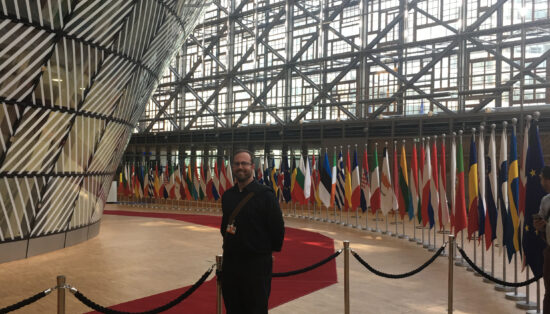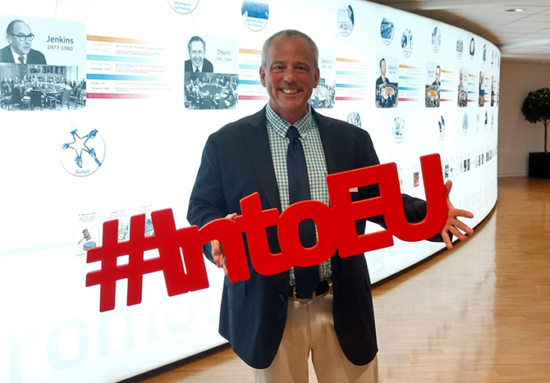By Bobby Henson, Social Studies Teacher, Villa Hills, KY

(Above) American teachers, curriculum developers, and education publishers participated in the Teaching the EU study tour this past June. Photo credit: Bobby Henson
Editor’s note: From June 23-29, Global Ties U.S. worked with the European Union Delegation to the United States on a custom exchange program to bring 14 American high school teachers and curriculum developers to Brussels, Belgium. The program was done in partnership with and funded by the European Union Delegation to the United States. Here are some of the participants’ takeaways from the program.

Bobby in the lobby of the EU Council in Brussels.
Last spring, a former student contacted me with details of the Teaching the EU Study Tour conducted by Global Ties U.S. and the European Union Delegation to the United States.
I teach American history, world history, and international relations at a small Benedictine high school in northern Kentucky. I also moderate our delegation to the Kentucky United Nations Assembly, a model UN that brings approximately 1,000 students across the commonwealth together to role-play the international experience. A strong focus on internationalism and engagement runs through my curriculum.
It was an honor to be included among the study tour participants, which was comprised of mostly teachers, as well as several education policy workers and a textbook publisher. Upon arriving in Brussels, we attended a dinner with Jerome Sheridan, Director of American University’s Brussels center. Throughout the week, we traveled to the European Parliament, the Council of the European Union, and various policy groups to discuss topics such as education, European politics, and the precarious nature of the transatlantic relationship. The speakers were universally engaging and the discussions were provocative.
For me, the best session was with Alexandros Karides, Desk Officer for the United States at the European Parliament, who walked us through the intricacies of the European Union’s policymaking. The EU crafts legislation very differently than the U.S., focusing on cooperation and compromise instead of a “winner-take-all” approach. Mr. Karides made clear how policies are written, debated, and voted on in the EU and helped us understand the process.
I return to my classroom this fall with a better understanding of European politics, a new perspective on teaching American politics, and a renewed respect for the transatlantic relationship.
For 70 years, Europe has known peace and (mostly) prosperity; America’s continued engagement is key to this success. This exchange program was a great reminder of the shared values that link America and Europe, and I am a better teacher for it. I am grateful for the opportunity to broaden my horizons and to bring back new ideas for my students.
By James “Jim” Price, History and High School Studies Teacher, Colchester, VT

It was an honor to participate in the Teaching the EU Study Tour. Focusing on a single experience from the study tour is difficult. I appreciated the visits to all four branches of the EU: the EU Parliament, European Council, Council of the European Union, and European External Action Service. Each of the speakers provided an intelligent and provocative summary regarding the structure and function of each body. I also appreciated the discussion on complicated issues of U.S. relations, Brexit, and the Iran nuclear deal.
A key theme that emerged was the focus on the “common good.” I believe this is an important concept to take back to all our students, including those who participate in the model United Nations I help run. I have taught Advanced Placement (AP) European History for over 20 years, international politics, and the United Nations for 16 years, in addition to currently teaching Holocaust studies and geography at Colchester High School in Colchester, VT.
It is beneficial for students to understand the structure and functions of the EU; I can introduce this in my AP European History class and role play the different bodies of the EU in my class on international politics and the United Nations.
It is difficult to wrap up this great learning experience in just a couple of paragraphs. In a perfect world, all of the learning experiences would continue for longer than a week. I thank Judy Donner of Global Ties U.S. and Tim Rivera of the European Union Delegation to the United States for this experience.
